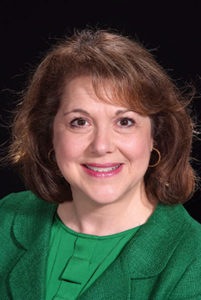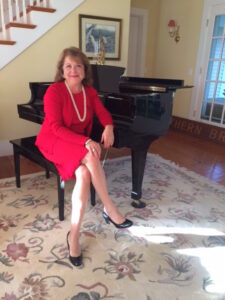By Brett Peruzzi, Contributing Writer

Chatham – Darby Hobbs originally planned to be a special education teacher, but when she decided to go into business instead, she didn’t leave behind her deeply held desire to help and educate people.
The 58-year-old Chatham resident got an MBA instead of a M.Ed, and embarked on a long career in the financial services industry. She started in retail banking, and then moved to the servicing side of mutual funds and progressed in various marketing management roles at several well-known companies, including Fidelity Investments. It was a booming business as more and more ordinary people invested in mutual funds for their IRA and 401k accounts. Her clients included financial advisors, asset managers, banks, and insurance firms, but she was far from the stereotypical ruthless executive sometimes portrayed in books and movies.
“What my work had been for many years was to approach my clients with a humanistic touch, a caring, listening mode, a way to speak to them as human beings to understand what they value and what is important to them,” Hobbs explained. “Once you build that bridge of caring and empathy towards any human being you then can engage on whatever level you need to, as it comes from the heart, the seat of all compassion.”
“This thinking led me to attend a conference in Chicago in the early 2000s that focused on CSR (Corporate Social Responsibility) and in attendance were many CEOs from various sectors, none of which were from financial services,” she recalled. “I later became certified in CSR and tried to bring many of these principles to the financial services industry, and as you can imagine I was met with a jaundiced eye if not a snicker or two.”

“I might not be that direct shareholder activist,” she asserted, “but I calmly set upon my path to methodically push the rock up the hill to educate, cultivate, engage and commune with like-minded individuals and campaigns across business, academia and society.”
That led her to “conscious capitalism,” which is defined as having a higher purpose for the creation of a business, and in that understanding you are creating a stakeholder strategy that allows for the intersection of profit and purpose.
In 2013, the commitment to such principles caused Hobbs to leave her corporate job and fully dedicate herself to her consulting business, SOCIAL3, to bring the concepts of corporate social responsibility, conscious capitalism, and, in turn, socially responsible investing, to more financial services companies.
“We highlight the emotional, environmental, financial, intellectual, physical, relational and spiritual aspects of an individual’s life,” said Hobbs. “That goes for a financial advisor within a firm and for an investor deciding on their wealth management strategy,”
“We believe that by connecting the heart, to the mind, to the wallet, we can unlock a newer form of investing DNA which will create a virtuous cycle of conscious capital formation,” she explained. “This in turn helps to fuel a sustainable living model where individuals are more mindful of where they invest all resources. We see a clear path to alter the investment advisory model away from old standards, to new norms reflecting alignment of human values into the investment process and approach.”
Hobbs is also using other methods to spread the word about the principles she holds so dearly. She is an adjunct professor at Boston University, teaching social entrepreneurship and impact investing, and served as the investor in residence for the student-led impact fund at Bridgewater State University for two years. Her latest project is editing and producing a book of essays written by 34 like-minded experts called “Aligning Hearts, Minds and Wallets: A Collective Experience (Reshaping Capitalism for the Greater Global Good).” It is slated for release in 2021.
Hobbs had this advice for older business professionals, especially those who are trying to pivot to more values-based work in their later years.
“Are you doing or have you done or followed your soul’s purpose?” she asked. “Have you listened to that inner child, the one that at the age of five knew exactly what you loved and wanted to do?”
“It takes great courage to find a way to incorporate what you enjoy on the foundation that you’ve built for many years.”
Photos/submitted












